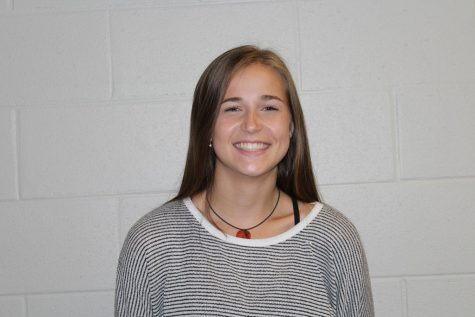Holocaust survivor shares life story, stresses importance of being good and respectful
Marion Lazan (middle) gives out hugs and takes pictures with her audience after her speech.
September 2, 2017
Nov. 9, 1938, the “Night of Broken Glass,” marked the beginning of one of the deadliest events to take place in history. Millions of people were taken from their homes and their lives changed instantly during the Holocaust, including Marion Lazan, a survivor and speaker on the topic.
Lazan travels around the globe with her husband, Nathaniel Lazan, telling her story of torture and survival to students and endorsing her book “Four Perfect Pebbles,” and many students from Oxford High School were able to listen to her story in person Aug. 28 at the Ford Center.
“This is the last generation that will hear this first-hand, definitely the very last, and that’s why we’re running as fast as we can, as long as we’re able to share the story and to relate the messages learned from that dark period of our history,” Lazan said. “That’s what’s important; the messages learned from that dark period of our history, to be kind and good and respectful towards one another regardless of where we come from or what we look like. That’s the basis of peace.”
Her book is based on the imaginary games that she would play in order to survive in the concentration camps and keep her distracted and occupied from her surroundings.
“We never had pencils or paper or books or games, so I was so lucky that I had such an imaginary mind. It’s these games that were my survival techniques,” Lazan said. “We all have survival techniques and skills within us. We just have to remember when the need arises that we search for them and that we find them and put them to work because no one is spared adversity; no one is spared hardship, but with perseverance, determination, faith and hope we can overcome just about anything and everything.”
During her speech, not only did she talk about her life during World War II, but she also took the time to stress how important respect for one another is.
“I think her message of supporting other people regardless of your differences was pretty important because, especially right now, in the country we need to be respectful of differences, and I thought that was a really good point as well as the fact that the Holocaust was obviously connected to history, and I think that’s something that we do need to think about,” junior Anneke Buskes said. “We need to remember the history to make sure it doesn’t repeat itself.”
During Lazan’s speech, she spoke of what life was like in these camps as a young girl. At the age of 10, she weighed only 35 pounds because of the amount of mistreatment she and so many others were faced with. The Nazi’s had so much hate and disrespect for so many innocent people, but even though Lazan had to live through that devastating time in history, she uses her experiences to help students understand the impact of the Holocaust on everyone’s lives along with their actions on the lives around them.
“Her story is bigger than just the Holocaust. She has taken the Holocaust and has turned her message into a message of hope,” History teacher John Mistilis said. “We don’t talk about hope enough, and we have kids at Oxford Public School that believe they have no hope, and when they can sit down and hear a relatively older lady who survived the Holocaust that they’ve read in books come to this town and preach and talk about how everybody deserves the opportunity to have hope, then it gives them hope.”
At the end of Lazan’s speech, she offered for everyone in the Ford Center that would like to come up and receive a hug from her to come and get one. Many of the students took her up on her offer.
“When you’re sitting in an auditorium and you see kids from all different backgrounds coming up to hug her, it means that she’s reaching everybody and not just one type of person, and that’s why her story is important,” Mistilis said. “She is reaching a very diverse group of individuals and not just one type of individual, and to see our students wanting to go and meet her after her speech, says to me that they received her message and they want to spread her message.”




